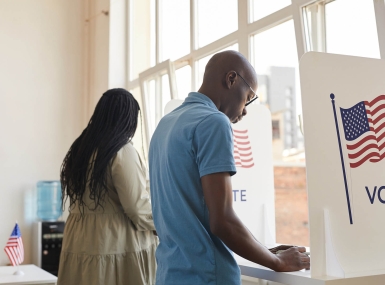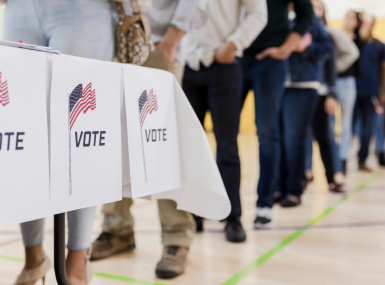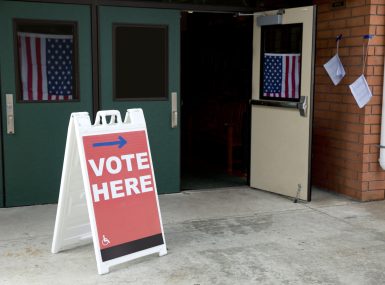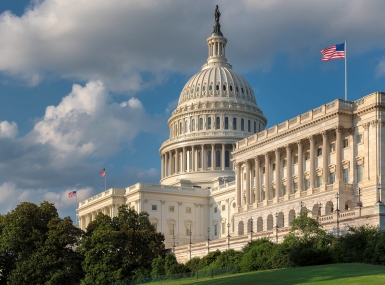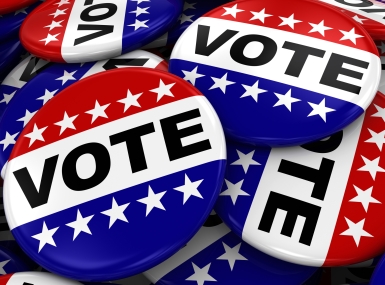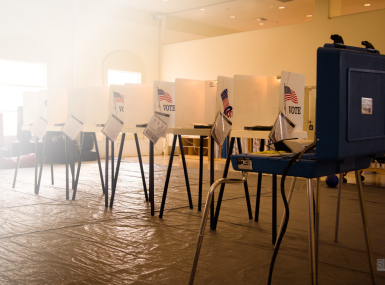Legislative Analysis For Counties: Enhanced Election Security & Protection Act

Author

Paige Mellerio
Upcoming Events
Related News
On July 21, 2022, a group of 14 U.S. Senators led by Sens. Joe Manchin (D-W.Va.) and Susan Collins (R-Maine) introduced a legislative package consisting of two bills related to elections and election reform – the Electoral Count Reform and Presidential Transition Improvement Act (S.4573) and the Enhanced Election Security and Protection Act (S. 4574). The bills represent a bipartisan agreement after months of failed negotiations over election reform.
While the first bill, S. 4573, would reform the Electoral Count Act of 1887 to clarify the roles of the U.S. Congress and Vice President in certifying electoral college votes in federal elections, it would not impact the county role in election administration.
However, the second bill, S. 4574, would directly impact the current federal supports and protections counties and our elections officials and workers receive. NACo welcomes the reforms included in S. 4574 but recognizes that more support is needed from the federal level for counties to maintain election integrity and administer secure and accurate elections. The bill does not include direct funding for counties, but mandates actions at the federal level to improve resources for state, local and tribal elections workers and would allow states to adopt some of these new resources at their discretion.
In the United States, the nation’s 3,069 counties traditionally administer and fund elections at the local level, including overseeing polling places and coordinating poll workers for federal, state and local elections. County election officials work diligently with federal, state and other local election officials to ensure the safety and security of our voting systems. County election officials strive to administer elections in a way that is accurate, safe, secure and accessible for all voters.
This analysis provides an overview of key provisions included in S. 4574 and how they may impact county governments.
Key Highlights
- Doubles the federal penalty for threats against election officials and workers
- Reauthorizes the U.S. Election Assistance Commission for five years
- Reforms the U.S. Postal Service’s handling of federal election mail
- Requires the U.S. Attorney General to issue guidance related to compliance with federal election record retainment and preservation requirements
- Increases the fine for willfully failing to preserve election records
- Doubles the federal penalty for willfully interfering with voting systems and individuals’ ability to vote
Overview of Provisions
The legislation would reform federal election supports and protection for election officials in the following ways.
Federal Protections For Elections Workers & Officials
The Enhanced Election Security & Protection Act would double the maximum federal penalty for certain crimes against federally protected activities related to voting and the conduct of elections from one to two years in prison. Under this provision, an individual charged with crimes against federally protected activities is defined as those who by force or threat of force willfully injures, intimidates or interferes with, or attempts to injure, intimidate or interfere with individuals from qualifying or acting as a poll watcher, or any legally authorized election official in any primary, special or general election.
This section would also give the same penalty – two years in prison – to individuals who harm or threaten individuals voting or qualifying to vote and qualifying or campaigning as a candidate for elective office.
COUNTY IMPACT Threats and violence against elections workers have been increasing in both frequency and intensity despite the 2020 General Election being deemed the “most secure in American history.”[1] In July 2021, U.S. Department of Justice (DOJ) launched the Elections Threats Task Force to address the rise in threats against elections workers and includes representatives from the Criminal, Civil Rights, and National Security Divisions of the DOJ, the Federal Bureau of Investigations (FBI), and U.S. Department of Homeland Security (DHS). As of August 1, 2022, the Task Force has reviewed over 1,000 cases of threats against the election community, however only 11 percent of these cases have met the threshold for a federal criminal investigation as they have included threats of unlawful violence and are therefore not protected by the free speech clause of the First Amendment.[2] According to a March 2022 survey of approximately 600 local election officials and workers, only 46 percent of those that have received threats related to their job have reported them to law enforcement.[3] The same survey found that of the local election officials and workers that have reported these threats, 89 percent reported these threats to local law enforcement and 22 percent reported to the FBI. This means that a large majority of threats against local election officials and workers are not directly reported to the appropriate federal authorities. Counties encourage the DOJ to continue reviewing the cases that are reported and working with local law enforcement to ensure that cases of threats towards election officials and workers are reported so they can be reviewed, investigated and in those cases that result in criminal indictment, appropriate penalties can be imposed. |
Election Mail Reform
If enacted, S. 4574 would reform the U.S. Postal Service’s (USPS) handling of election mail to improve the security and administration of vote-by-mail. The bill classifies federal election mail as any item mailed to or from an election official that enables individuals to vote in a federal election. The bill specifically enumerates ballots, voter registration cards, absentee voting applications and polling place notifications as federal election mail.
State and local governments are not required to comply with the election mail related provisions. However, the bill would do the following:
- Create best practices for election mail: The bill would require USPS to issue best practices guidance related to federal election mail for state, local, tribal and territorial governments by September 30 of each odd-numbered year. It would also require the report to, at minimum, include information on:
- Optimal timing for voters to request and return absentee or mail-in ballots for federal elections
- The design, physical standards and format of envelopes containing physical voting materials for federal elections that are processed through the mail (i.e. ballot envelopes)
- The use of identifying information (labels, logos, etc.) to designate federal election mail for more efficient USPS processing
- Other topics the USPS might identify that could improve the efficiency of election mail
- Coordinate election mail services: This legislation would designate employees to coordinate with mail processing plans, post offices, retail and delivery units and postal employees to ensure federal election mail is handled appropriately and that internal compliance reporting requirements and metrics are developed. The bill would also require USPS to designate at least one Election Mail Advisor in each state to provide information, guidance and coordination to assist state and local election officials manage the use of absentee and mail-in ballots. The USPS would determine how many Election Mail Advisors there would be per state based on the state’s population and election administration structure. Advisors would be tasked with:
- Providing election officials with information on USPS regulations, processes and regional service standards related to processing federal election mail
- Relaying best practices for the handling of election mail
- Other duties to improve election official’s capacity to administer elections using absentee and mail-in ballots
- Create standardized federal ballot mail design: S. 4574 would require USPS to create standardized mail ballot envelope design parameters and features for blank outbound ballots and returning inbound ballots that a state may choose to use in federal elections. USPS would be tasked with providing advice for election officials on how to improve the tracking and visibility of mail-in ballots for federal elections by mailpiece design analysts, USPS employees specially trained to provide mailpiece design technical assistance. Election Mail Advisors would be tasked with ensuring ballot mail envelope designs are consistent with the standardized parameters and features if they are adopted by the state.
- Require daily ballot search & certification: The bill would make several reforms to USPS’ handling of election mail which includes requiring the USPS to conduct daily inspections for ballots in each USPS facility that processes federal election mail no later than 14 days before the date of the federal election and ending no earlier than seven days after the last day the respective state accepts ballots in any federal election. Managers or supervisors at each USPS facility would be required to certify on record each day during this period that all election mail ballots scheduled to depart have left the facility that day.
- Reform federal election mail processing: If enacted, the bill would prohibit the USPS from implementing any service standard changes that would slow or impact the efficient delivery of federal election mail or taking steps to meaningfully interfere with USPS service standards or its ability to prioritize the processing and timely delivery of election mail during the 90-days preceding a federal general election. Additionally, the bill would require USPS to:
- Collect and process mail in a USPS district the Sunday before a general election is being held in that district
- Coordinate with election officials to operate on extended hours to process election mail prior to a federal election
- Implement procedures to apply a physical postmark (or other physical indication) with a clear, legible date to each identifiable ballot envelope indicating when the envelop was returned by mail to the extent possible
COUNTY IMPACT USPS has already employed many of the requirements outlined in the bill related to election mail as informal, widespread local practice. For example, during the 2020 election amidst the COVID-19 public health emergency there was a massive increase in the use of mail-in ballots to avoid being exposed to the virus if they were to vote in person. To address this increase of mail-in ballots, the USPS implemented daily sweeps for ballots in facilities to certify that all ballots were departed and processed mail on the Sunday before election day, both of which are requirements in the bill. S. 4574 would require USPS facilities to adopt these practices that many already do for every federal election moving forward to support the election system. In setting USPS ballot search and certification parameters, the bill recognizes that state laws vary regarding the last day ballots in federal elections can be accepted. In 32 states, mail-in ballots must be received by Election Day to be accepted while the remaining 18 states and Washington, D.C., allow mail-in ballots to be counted if they are postmarked by Election Day but received later. S. 4274 would prescribe the ballot search and certification schedule based on state laws and does not require states, and ultimately counties, to accept ballots on a by a certain date or timespan after the election. The USPS is a critical partner to counties in maintaining election integrity. Counties support a domestic and international mail system that supports our election system and ensures that all voters, including those in the military and overseas, can fairly and freely participate in our elections. Such a system would include high quality delivery methods, tracking and notice of changes to impacted local governments. There is a discrepancy, however, in the USPS’ capacity in more rural counties compared to mid-sized and large urban counties. Capacity issues coupled with much longer delivery routes in rural areas means that mail is delivered much slower in rural counties and overnight mail deliveries are infeasible. Furthermore, in the nation’s most rural communities, some residents do not receive USPS residential mail delivery. This can sometime lead to undeliverable ballots returning too late for a new one to be issued, completed ballots returning too late to be counted, and election mail being lost entirely. During elections, many rural counties coordinate directly with their local postmaster to have local mail sorted locally to bypass distribution centers and deliver election mail quicker. Counties urge the USPS to continue working with rural counties to ensure election mail is delivered efficiently and on time. |
Reauthorization of the U.S. Election Assistance Commission
The Enhanced Election Security & Protection Act would reauthorize the U.S. Election Assistance Commission (EAC) for five years, or through Fiscal Year (FY) 2027 and amends the 2002 Help America Vote Act (HAVA; P.L.107-252) – which established the EAC – to remove the $10 million discretionary appropriations cap on the EAC’s operating budget. Ultimately, this would authorize Congress to appropriate the funds necessary for the EAC to administer grants and provide best practices and other resources to state and local election officials.
HAVA also authorized the EAC to assist state and local governments administer elections through the testing and certification of voting machines and systems. The criteria and specific requirements that voting systems must meet to be EAC certified are outlined in the agency’s voluntary voting system guidelines (VVSG). The EAC will certify a voting system when it has been tested by a federally accredited laboratory and has met the requirements of the VVSG and any other claims made by the manufacturer. S. 4574 would require the EAC to include penetration testing as part of its testing and certification (including decertification and recertification) of voting system hardware and software.
COUNTY IMPACT Counties strongly support the role and functions of the EAC which recognizes and focuses on the importance of rigorous testing of voting equipment and brings together election technology experts and local election officials to develop guidelines and standards that protect our critical infrastructure and appreciates the efficiencies and cost savings of voluntary federal certification. Counties support this process and oppose any efforts to create further federal certification processes in addition to the EAC certification. S. 4574 would not create additional certification outside the EAC but would instead enhance the current EAC certification process to include penetration testing. Voting machines and systems would still have to meet the other certification requirements outlined in the VVSG that are primarily developed by the EAC with input from the Standards Board and Board of Advisors. The Standards Board is a 110-member board comprised of 55 state election officials and 55 local election officials, including several county election officials. The Board of Advisors is a 35-member board comprised of representatives from several federal agencies, members of Congress, and organizations representing election officials or other election-related matters, including NACo. Counties have a seat at the table in setting federal election standards and guidelines and S. 4574 would not diminish the county role in this process. |
Election Record, Paper & Voting System Protection
If enacted, the bill would require the U.S. Attorney General, in consultation with the Director of the Cybersecurity and Infrastructure Security Agency (CISA), to issue informal guidance related to compliance with federal election record retention and preservation requirements as well as recommendations for compliance. Currently, federal law requires election officials to retain and preserve all records and papers related to any requisite to voting for 22 months following any general, special or primary election for federal office. This includes, but is not limited to, any registration form, ballot (used or unused), mail-in ballot envelope, voter verified paper audit trail (VVPAT), voting machine report, or election day precinct log used in a federal election. The EAC currently does not have official guidance or recommendations related to election record retention and preservation.
S. 4574 would also increase the penalty for willful failure to retain and preserve election records from a $1,000 fine and no more than one-year sentence to prison to a $10,000 fine or no more than two-year sentence to prison. Additionally, the bill would make the theft, destruction, concealment, mutilation or alteration of voting systems in an attempt to knowingly and willfully deprive or defraud, or attempt to deprive or defraud, voters of a free and fair election process punishable by a determined fine or up to five-years in federal prison.
COUNTY IMPACT As mentioned above, the EAC does not currently have any formal guidance related to election record or retention. Counties are required to comply with federal election record retention requirements as well as the retention requirements of their respective state and guidance developed with the input of state and local election officials. Additionally, in response to the recent rise in mis-, dis-- and malinformation surrounding the administration of elections, county election officials have been flooded with records requests under the Freedom of Information Act (FOIA) and record retention and preservation guidance should also include best practices for producing FOIA-requested records. |
Next Steps for Counties
Counties will continue to work with our federal partners as they work to craft meaningful election reform.
Endnotes
[1] Cybersecurity & Infrastructure Security Agency. (2020, November 12). Joint Statement from Elections Infrastructure Government Coordinating Council & the Election Infrastructure Sector Coordinating Executive Committees [Press Release]. https://www.cisa.gov/news/2020/11/12/joint-statement-elections-infrastructure-government-coordinating-council-election
[2] U.S. Department of Justice. (2022, August 1). Readout of Election Threats Task Force Briefing with Elections Officials and Workers [Press Release]. https://www.justice.gov/opa/pr/readout-election-threats-task-force-briefing-election-officials-and-workers
[3] Currie, S., Ebrahimi, E., Wilentz, B. (2002). Local Election Officials Survey [Data set]. The Brennan Center for Justice. https://www.brennancenter.org/our-work/research-reports/local-election-officials-survey-march-2022

